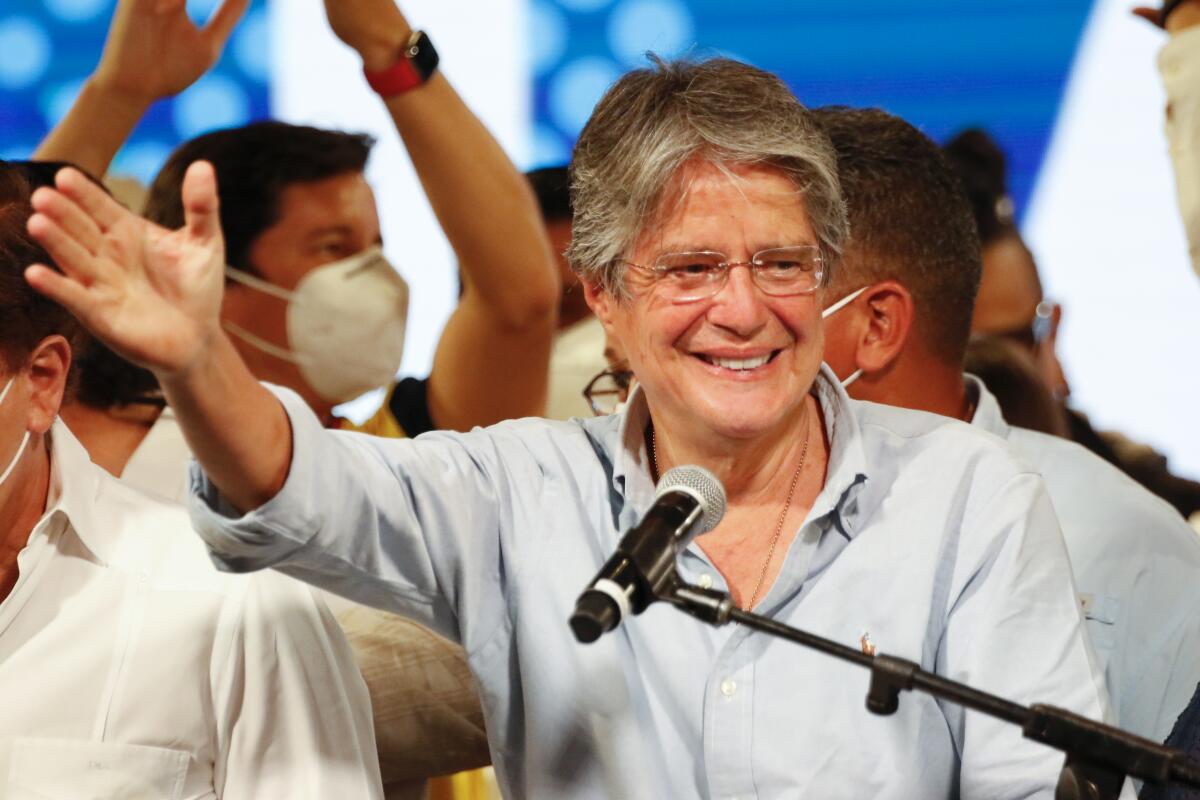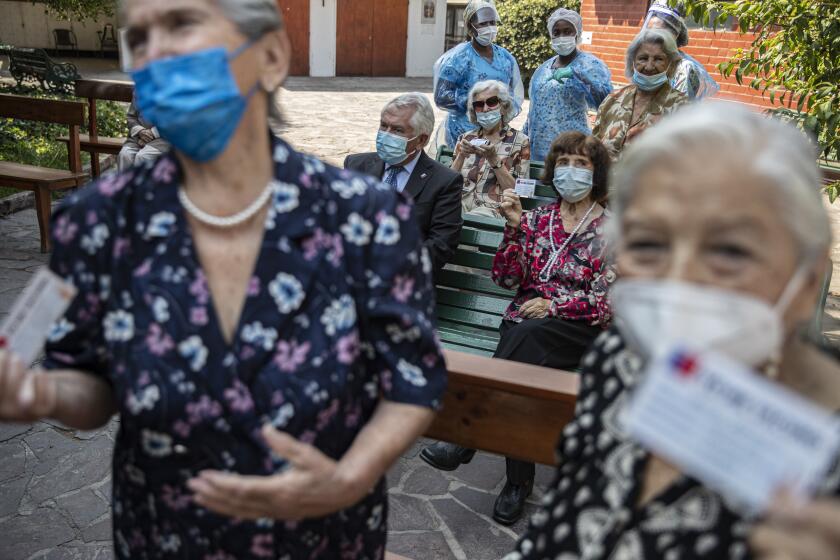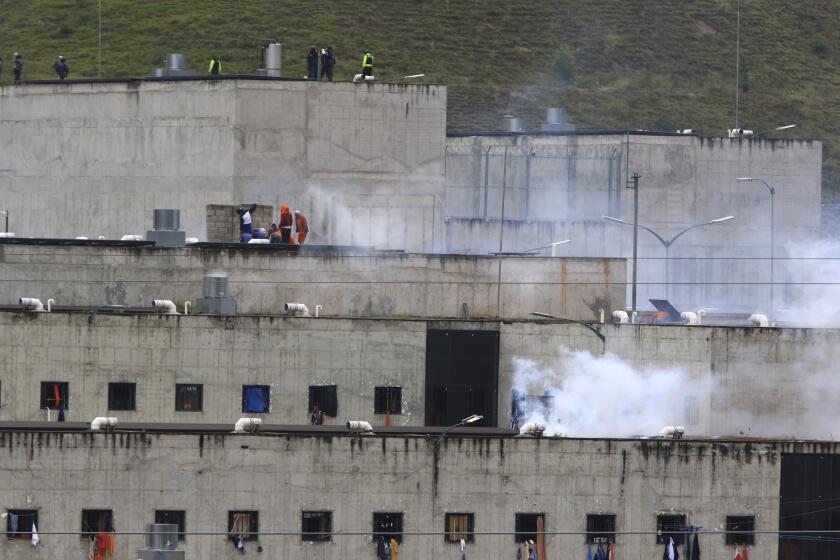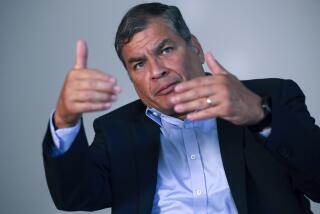Ecuador appears to go with conservative banker Guillermo Lasso in presidential vote

QUITO, Ecuador — A conservative businessman seemed headed to Ecuador’s presidency, with voters rejecting the leftist movement started by former President Rafael Correa more than a decade ago, while in neighboring Peru, a crowded field of 18 presidential candidates was virtually certain to result in a second round of voting in June.
The South American nations held elections Sunday under strict public health measures amid a recent spike in COVID-19 cases and the return of lockdowns. Peruvians also elected a new Congress.
The Electoral Council in Ecuador had not declared an official winner in the contest to replace President Lenín Moreno next month, but results released by the agency showed former banker Guillermo Lasso with about 53% of votes and leftist Andrés Arauz at 47%, with more than 93% of votes counted. Arauz had led the first round of voting with more than 30% on Feb. 7, while Lasso edged into the final by finishing about half a percentage point ahead of environmentalist and Indigenous candidate Yaku Pérez.
Arauz conceded the election, and so did his main backer, Correa, a major force in the South American country despite a corruption conviction that sent him fleeing to Belgium beyond the reach of Ecuadoran prosecutors. Moreno was also an ally of Correa but turned against him while in office.
“Sincerely, we believed we would win, but our projections were wrong,” Correa tweeted. “Good luck to Guillermo Lasso, his success will be that of Ecuador.”
Correa governed from 2007-17 as an ally of Cuba’s Fidel Castro and Venezuela’s Hugo Chavez. He oversaw a period of economic growth driven by an oil boom and loans from China that allowed him to expand social programs, build roads and schools, and pursue other projects.
Voters go to the polls in Ecuador and Peru on Sunday in contentious elections shaped by fallout from the pandemic.
But Correa increasingly cracked down on opponents, the press and businesses during his latter stage in office and feuded with Indigenous groups over development projects. Ecuador also hit an economic slowdown in 2015, largely driven by the drop in oil prices.
Lasso finished second in the previous two presidential contests. He favors free-market policies and Ecuador’s rapprochement with international organizations. During the campaign, he proposed raising the minimum wage, finding ways to include more youth and women in the labor market, and eliminating tariffs for agricultural equipment.
“For years, I have dreamed of the possibility of serving Ecuadorians so that the country progresses, so that we can all live better,” Lasso said before a room full of supporters despite social distancing guidelines. “Today, you have resolved that this be so.”
Accompanied by his wife, María de Lourdes Alcívar, Lasso said that from May 24 on he will dedicate himself “to the construction of a national project that continues to listen to everyone, because this project will be yours.”
After being among the world’s hardest-hit nations with COVID-19, Chile is now near the top at vaccinating its population against the virus.
Despite his declared conservative position on issues such as marriage equality, he promised to accept other points of view.
Elections officials did not plan to declare a winner Sunday, but at least one head of state congratulated Lasso on the election’s outcome. Uruguayan President Luis Lacalle Pou tweeted that he had spoken with Lasso “to congratulate him on his success and to get to work together on the issues that our countries have in common.”
Ecuador is deep in a recession that many fear will worsen as lockdowns return because of a spike in COVID-19 cases. Ecuador has tallied more than 344,000 cases and more than 17,200 deaths as of Sunday, according to data from Johns Hopkins University.
The new president’s main task will be “to de-polarize the country,” said Grace M. Jaramillo, an adjunct professor at the University of British Columbia whose research includes Latin America. “There will be no signs of governance if the new government does not reach out and generate a platform where agreements with the [National] Assembly are possible.”
Breaking News
Get breaking news, investigations, analysis and more signature journalism from the Los Angeles Times in your inbox.
You may occasionally receive promotional content from the Los Angeles Times.
In Peru, elections officials late Sunday said leftist teacher Pedro Castillo had 15.8% of the support with 11.4% of votes counted. He was followed by right-wing economist Hernando de Soto with 14.4% support, ultra-conservative businessman Rafael López Aliaga with 13.1% and opposition leader Keiko Fujimori with 12.1%. Fujimori is the daughter of divisive former President Alberto Fujimori.
To avoid a June 6 runoff, a candidate must obtain more than 50% of votes.
Peru’s election turned into a popularity contest in which one candidate even addressed how he suppresses his sexual desires. The crowded field of presidential hopefuls came months after the country’s political chaos reached a new level in November, when three men were president in a single week after one was impeached by Congress over corruption allegations and protests forced his successor to resign in favor of the third.
All former Peruvian presidents who governed since 1985 have been ensnared in corruption allegations, some imprisoned or arrested in their mansions. One died by suicide before police could arrest him.
Authorities in Ecuador say 62 people have died in riots at prisons in three cities as a result of fights between rival gangs and an escape attempt.
Claudia Navas, a political, social and security risk analyst with the global firm Control Risks, said the fragmented election was the result of a political system that has 11 parties lacking ideological cohesiveness. She said Peruvians overall do not trust politicians, with corruption being a key driver of the disillusionment toward the political system.
Navas said the congressional elections would likely result in a splintered legislature, with no party holding a clear majority and political alliances remaining short-lived. She said the new Congress also was likely to continue to exercise its impeachment authority to reinforce its influence and block any initiative that threatens its power.
“So, we’ll likely continue to see significant legislative populism. This implies moves that seek to satisfy the public short-term needs and demands to the detriment of medium- and long-term sustainability,” Navas said. “Regardless of who wins, we believe that the president is somewhat unlikely to complete his or her term in office because of the populist type of stance of the Congress and the risk of political instability is likely to persist through the administration.”
The country is among the hardest hit by COVID-19, with more than 1.6 million cases and more than 54,600 deaths as of Sunday.
Associated Press writer Regina Garcia Cano reported from Mexico City and Gonzalo Solano from Quito.
More to Read
Sign up for Essential California
The most important California stories and recommendations in your inbox every morning.
You may occasionally receive promotional content from the Los Angeles Times.












